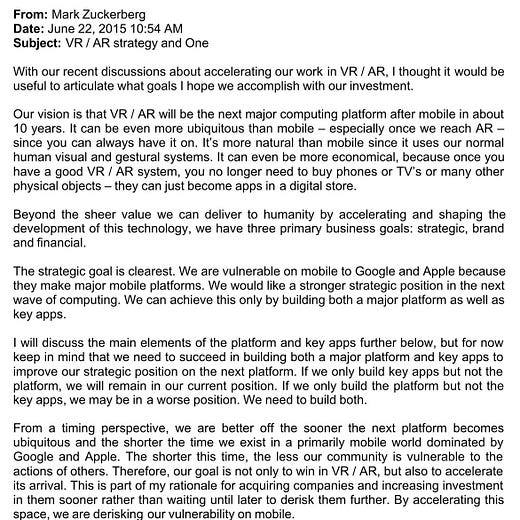The Digest #141
Old Books, Damodaran on FCF, Bonus Clawbacks, Meta's Plunging Stock, Bogleheads, Alfred Sloan, David Einhorn, FDR
Quote of the Week
“Most people read the same new books that everyone else has read, not necessarily for the ideas but for the social reward of being able to talk about them with others. Reading the same thing as everyone else is only going to put the same ideas in your head that everyone else has. If you want new ideas, read old books.”
— Farnam Street’s Brain Food newsletter on Choosing Your Next Book
Old Books
Very few books published this year will remain in print decades from now. Many books are intended to cover current events and the author might have no expectation that the book will be timeless. But the sad reality is that most books that are meant to be perennial will fail to survive. Some might even deserve to become classics but nonetheless die in obscurity, but more often out-of-print books just fail to resonate.
As I look through the list of books I have read this year, I can see that most of them were written quite recently. Seventeen were written in the current century, five were written in the twentieth century, and five were written in the nineteenth century.
Of the nineteenth century books, two were written by Leo Tolstoy and three were written by Fyodor Dostoevsky. I wrote about my experience reading War and Peace and Anna Karenina during the first quarter which was followed by Crime and Punishment and The Brothers Karamazov which I read during the second quarter. Earlier this week, I finished reading The Idiot, another Dostoevsky classic.
Although these old novels are more challenging to read than contemporary fiction, they are still quite accessible. However, in order to understand these books, particularly Dostoevsky’s, it is important to be familiar with an even older book: the Bible. Dostoevsky clearly assumed that his readers would be familiar with the Bible. Without that background, many aspects of The Idiot would be incomprehensible.
In The Book You Need to Read, David Perell makes a convincing case for reading the Bible from a secular perspective because so much of western civilization is built on biblical understanding. Perell stresses that he’s not trying to evangelize for religion but making his recommendation as a non-believer who nonetheless considers the Bible an essential text. Like Perell, I am not advocating the adoption of any faith, but I do consider the Bible to be an essential text worth serious study given its massive impact.
Over one hundred book reviews have been published on The Rational Walk since 2009.
The Rational Walk is a reader-supported publication
To support my work and to receive all articles that I publish, including premium content, please consider a paid subscription. Thanks for reading!
Articles
Earnings and Cash Flows: A Primer on Free Cash Flow by Aswath Damodaran, October 25, 2022. This article counters many misunderstandings regarding the estimation of free cash flow. “Free cash flow is one of the most dangerous terms in finance, and I am astonished by how it can be bent to mean whatever investors or managers want it to, and used to advance their sales pitches. I have seen analysts and managers argue that adding back depreciation to earnings gives you free cash flow, an intermediate stop, at best, if you truly are intent on computing free cash flow…” (Musings on Markets)
Accounting Errors to Cost Executives Their Bonuses Under SEC Rule by Paul Kiernan, October 26, 2022. It is hard to argue that executive bonuses should not be clawed back if accounting errors are discovered that would have precluded the bonus from being paid in the first place. Ideally, mandating such policies should be done by boards rather than the government. It is perhaps a testament to the ineffectiveness of boards that the SEC feels a need to implement such a rule. Incentives must also be carefully considered. In the future, more compensation may be tilted toward base salary in order to avoid potential bonus clawbacks under the new rule. (WSJ)
Joe Brandon's Triumphant Return to Berkshire Hathaway by Kingswell, October 27, 2022. Berkshire Hathaway closed on its acquisition of Alleghany on October 19. Allegheny’s CEO, Joe Brandon, has a long history at Berkshire’s General Re unit. He was forced by the government to resign from General Re in 2008 but never lost Warren Buffett’s confidence. Bringing Joe Brandon back to Berkshire is one of the key aspects of the Alleghany acquisition. There are good reasons to believe that Joe Brandon could be an eventual successor to Vice-Chairman Ajit Jain. (Kingswell)
Meta 3Q'22 Earnings Update by Abdullah Al-Rezwan, October 26, 2022. Meta’s third quarter earnings release was greeted with horror this week and shares plummeted to multi-year lows. While I do not know nearly enough about Meta to put forward an opinion on the situation, many value investors are looking at the company quite seriously. This is a useful summary of some of the key data points. (MBI Deep Dives)
Meet the Bogleheads by Jason Zweig, October 26, 2022. Jason Zweig writes about attending the Bogleheads conference, a group of investors who follow the principles of Jack Bogle, founder of the Vanguard Group, who died in 2019. From his interviews of attendees, it seems like the sense of community is what attendees find most helpful. “What if investing firms fostered a community of people with a shared interest in patience, good judgment and skeptical analysis? Investors would be a lot more willing to go along for the ride if they felt they weren't alone. The hills and valleys of the markets feel a lot less steep when you feel you have friends going alongside you.” (The Intelligent Investor)
Book review of Enough: True Measures of Money, Business, and Life by John C. Bogle, January 25, 2019. (The Rational Walk)
Expectations and Reality by Morgan Housel, October 24, 2022. “I have a friend who grew up in abject poverty in Africa. He now works in tech in California. He says to this day he is still blown away when a hot meal is put in front of him. It’s astounding to him how abundant food is in America. Part of me is a little envious of that trait – he finds immense pleasure from something I don’t think twice about.” (Collaborative Fund)
The Three-Step Learning Model by Sahil Bloom, October 25, 2022. Sahil Bloom has adapted Richard Feynman’s learning framework for his own purposes. Bloom’s framework consists of 1) Read & Research; 2) Teach; and 3) Assess & Iterate. I like his focus on learning by teaching, which can include writing about a subject. I have found that there is no better way to understand how well you really know a subject than by writing about it. Writing about a subject or teaching it reveals gaps in knowledge more clearly than any other method that I know of. (The Curiosity Chronicle)
Podcasts
My Years with General Motors: The Autobiography of Alfred Sloan, April 26, 2022. 1 hour, 5 minutes. I’ve been slowly working my way through many of the episodes of David Senra’s Founder’s Podcast. An enormous catalog of biographies of entrepreneurs and founders is available. I’ve been listening to podcasts covering books that I have read, so I found this one on Alfred Sloan interesting. Sloan was not the founder of General Motors, but he was the man responsible for building it for over four decades. My review of the book was written in 2016. (The Founder’s Podcast)
David Einhorn on Value Investing: Will it Ever Come Back?, October 22, 2022. 47 minutes. David Einhorn recently expressed skepticism regarding whether value investing will be relevant in the future. In this podcast, Elliot Turner, Phil Ordway, and John Mihaljevic discuss the current investing landscape and Einhorn’s statements. (This Week in Intelligent Investing)
Confessions of a Recovering Asshole, October 25, 2022. 29 minutes. I thought that this was a very candid and valuable discussion. It is all too easy to fall into dysfunctional dynamics that can harm a team, so a zero tolerance policy seems to make quite a bit of sense. “Your team may have an asshole problem. How can you fix it? Brent Beshore tells David how things had gotten so bad in the early days of Permanent Equity that a No Asshole Policy had to be put in place.” (Permanent Podcast)
FDR’s Polio Made Him Wheelchair Bound, But Also an Incredible Orator and Strategic Mastermind, October 24, 2022. 46 minutes. It isn’t necessary to agree with Franklin Roosevelt’s politics to respect how he was able to overcome serious disabilities and still serve effectively as President. More controversially, however, he concealed the true extent of his disability from the American people. This is an interesting discussion of how FDR’s devastating illness changed the course of his life in the 1920s and 1930s and how he refused to be defeated by it. (History Unplugged)
Tweets of the Week
The Austrian century bond represents a great example of “return free risk”, as Chris Bloomstran describes in this thread. What a debacle!
Mark Zuckerberg wrote a memo about the metaverse in 2015. David Perell’s tweet links to the memo which offers some insight into why Meta is spending so heavily on its Reality Labs segment today, a decision that’s being punished severely in the market.
One painting for every year of the nineteenth century. These are amazing. The twentieth century was so eventful (and recent) that we sometimes forget how much the world changed between 1800 and 1900, which is what I was thinking about as I read this thread. I particularly like this painting of Benjamin Franklin, one of the leading men of the eighteenth century.
If you enjoyed reading the Weekly Digest, please click on the ❤️️ button and consider sharing this issue with your friends and colleagues.
Thanks for reading!
Copyright and Disclaimer
Nothing in this newsletter constitutes investment advice and all content is subject to the copyright and disclaimer policy of The Rational Walk LLC.
Your privacy is taken very seriously. No email addresses or any other subscriber information is ever sold or provided to third parties. If you choose to unsubscribe at any time, you will no longer receive any further communications of any kind.
The Rational Walk is a participant in the Amazon Services LLC Associates Program, an affiliate advertising program designed to provide a means for sites to earn advertising fees by advertising and linking to Amazon.com.







Incredible that you could finish War and Peace and Anna Karenina in one quarter!
Great content